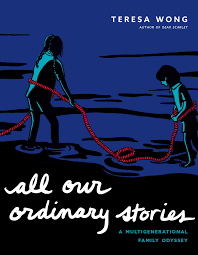
All Our Ordinary Stories
Nothing is ordinary about the narratives we encounter in All Our Ordinary Stories, the second graphic memoir by writer and illustrator Teresa Wong. When her mother appears to grow despondent and melancholy after suffering a stroke, Wong contemplates her family’s story of uprooting from Guangzhou, China, to settle in Canada. Using the comic form, Wong illustrates ruptures and pauses in outsider lives. We learn about the long arc of suffering and triumphs endured by her parents during the Chinese Cultural Revolution. Wars, societal conflicts, and oppressive regimes led her forebears to leave their homes and find better lives in distant lands, a journey that inspires hope and resilience.
I engaged with the book from my perspective as a first-generation immigrant. The themes of self-sacrifice, ambition, and loss surface throughout Wong’s narrative, and they are intimate and familiar. Wong shares the legacy of family separation from ancestral lands and fractures across the diaspora. Fellow immigrants may find solace in Wong’s confession that she harbored guilt for losing fluency and faculty in her mother’s language, thus limiting her ability to connect emotionally. Wong tells this story with plenty of heart and a deep sense of gratitude for where her ancestors have been and the heritage of generational grief and survival.
I engaged with the book from my perspective as a first-generation immigrant. The themes of self-sacrifice, ambition, and loss surface throughout Wong’s narrative, and they are intimate and familiar. Wong shares the legacy of family separation from ancestral lands and fractures across the diaspora. Fellow immigrants may find solace in Wong’s confession that she harbored guilt for losing fluency and faculty in her mother’s language, thus limiting her ability to connect emotionally. Wong tells this story with plenty of heart and a deep sense of gratitude for where her ancestors have been and the heritage of generational grief and survival.

cheap enclomiphene generic uk
buy enclomiphene online melbourne
enclomiphene ONLINE FEDEX COD FREE CONSULT
180 kamagra livré le samedi
kamagra canada échantillon gratuit
generique kamagra prescrire eu medicament
how to order androxal australia suppliers
how to order androxal new zealand buy online
price of androxal at a pharmacy
buy cheap dutasteride price in canada
dutasteride canada
get dutasteride generic new zealand
how to order flexeril cyclobenzaprine canada low cost
buying flexeril cyclobenzaprine generic online buy
flexeril cyclobenzaprine substitute over the counter
fildena without a perscription shipped overnight express
discount fildena generic is good
order fildena cheap in uk
buy gabapentin purchase australia
buying gabapentin online from canada
how to order gabapentin generic europe
cheapest buy itraconazole canada discount
get itraconazole new zealand buy online
buying itraconazole generic europe
how to order staxyn purchase line
fedex staxyn overnight
no prescription required staxyn
discount avodart us overnight delivery
cheap avodart generic switzerland
comprar avodart on line
buy cheap rifaximin generic buy online
cheap rifaximin canada internet
discount rifaximin price usa
discount xifaxan generic drug india
online order xifaxan american express
get xifaxan purchase online from india
obecná kanada kamagra
si můžete koupit kamagra v mexiku
koupit kamagra v sydney